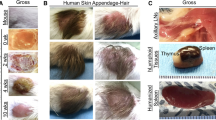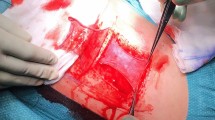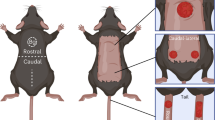Abstract
Werder and Hardin1,2 have reported that splenectomy prolongs the survival time of homologous skin grafts on CFW mice, and that application of consecutive, randomly selected homografts would produce permanent survival of homologous skin grafts on heterozygous CFW mice. In view of this unexpected finding and its possible significance to present theories of the mechanisms of homograft rejection, a similar investigation was made in a strain of non-inbred mice.
This is a preview of subscription content, access via your institution
Access options
Subscribe to this journal
Receive 51 print issues and online access
$199.00 per year
only $3.90 per issue
Buy this article
- Purchase on Springer Link
- Instant access to full article PDF
Prices may be subject to local taxes which are calculated during checkout
Similar content being viewed by others
References
Werder, A. A., and Hardin, C. A., Surgery, 35, 405 (1954).
Werder, A. A., and Hardin, C. A., Surgery, 36, 371 (1954).
Author information
Authors and Affiliations
Rights and permissions
About this article
Cite this article
SHORTER, R., TITUS, J. & LEVY, D. Consecutive Skin Grafting in Swiss-Webster Mice. Nature 201, 1144–1145 (1964). https://doi.org/10.1038/2011144a0
Issue Date:
DOI: https://doi.org/10.1038/2011144a0
Comments
By submitting a comment you agree to abide by our Terms and Community Guidelines. If you find something abusive or that does not comply with our terms or guidelines please flag it as inappropriate.



